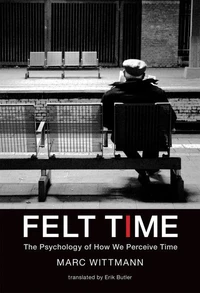What can altered states of consciousness-the dissolution of feelings of time and self-tell us about the mystery of consciousness? A groundbreaking study of out-of-body-experiences, drug intoxication, and shock-perfect for readers interested in psychedelics, psychology and meditation. During extraordinary moments of consciousness-shock, meditative states and sudden mystical revelations, out-of-body experiences, or drug intoxication-our senses of time and self are altered; we may even feel time and self dissolving.
These experiences have long been ignored by mainstream science, or considered crazy fantasies. Recent research, however, has located the neural underpinnings of these altered states of mind. In this book, neuropsychologist Marc Wittmann shows how experiences that disturb or widen our everyday understanding of the self can help solve the mystery of consciousness. Wittmann explains that the relationship between consciousness of time and consciousness of self is close; in extreme circumstances, the experiences of space and self-intensify and weaken together.
He considers the emergence of the self in waking life and dreams; how our sense of time is distorted by extreme situations ranging from terror to mystical enlightenment; the experience of the moment; and the loss of time and self in such disorders as depression, schizophrenia, and epilepsy. Dostoyevsky reported godly bliss during epileptic seizures; neurologists are now investigating the phenomenon of the epileptic aura.
Wittmann describes new studies of psychedelics that show how the brain builds consciousness of self and time, and discusses pilot programs that use hallucinogens to treat severe depression, anxiety, and addiction. If we want to understand our consciousness, our subjectivity, Wittmann argues, we must not be afraid to break new ground. Studying altered states of consciousness leads us directly to the heart of the matter: time and self, the foundations of consciousness.
What can altered states of consciousness-the dissolution of feelings of time and self-tell us about the mystery of consciousness? A groundbreaking study of out-of-body-experiences, drug intoxication, and shock-perfect for readers interested in psychedelics, psychology and meditation. During extraordinary moments of consciousness-shock, meditative states and sudden mystical revelations, out-of-body experiences, or drug intoxication-our senses of time and self are altered; we may even feel time and self dissolving.
These experiences have long been ignored by mainstream science, or considered crazy fantasies. Recent research, however, has located the neural underpinnings of these altered states of mind. In this book, neuropsychologist Marc Wittmann shows how experiences that disturb or widen our everyday understanding of the self can help solve the mystery of consciousness. Wittmann explains that the relationship between consciousness of time and consciousness of self is close; in extreme circumstances, the experiences of space and self-intensify and weaken together.
He considers the emergence of the self in waking life and dreams; how our sense of time is distorted by extreme situations ranging from terror to mystical enlightenment; the experience of the moment; and the loss of time and self in such disorders as depression, schizophrenia, and epilepsy. Dostoyevsky reported godly bliss during epileptic seizures; neurologists are now investigating the phenomenon of the epileptic aura.
Wittmann describes new studies of psychedelics that show how the brain builds consciousness of self and time, and discusses pilot programs that use hallucinogens to treat severe depression, anxiety, and addiction. If we want to understand our consciousness, our subjectivity, Wittmann argues, we must not be afraid to break new ground. Studying altered states of consciousness leads us directly to the heart of the matter: time and self, the foundations of consciousness.

 , qui est-ce ?
, qui est-ce ?